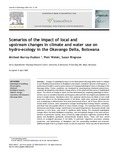| dc.description.abstract | Changes in hydrological inputs to the flood-pulsed Okavango Delta result in changes in such flooding characteristics as floodplain water depth, inundation duration and frequency. A mathematical model is used to assess impacts of changing hydrological inputs on flooding in the Okavango Delta. Future conditions are simulated by superimposing simulated abstractions, upstream developments and climate change effects on the observed time series of hydrological inputs. The effects of change in inputs are then determined by comparing hydrological characteristics such as inundation duration and frequency derived from the original and modified time series of model outputs. Simulations show that upstream abstractions are likely to have small short-term effects on the flooding pattern in the Delta, while other upstream developments such as damming or deforestation have more pronounced effects. All of these effects are relatively small, however, when compared to changes resulting from existing climatic variability, and those from the possible effects of future climate change. The combined effects of human abstraction and climate change, manifested as increased temperatures, decreased rainfall, and reduction in river flows, may result in significant Delta drying. The simulated hydrological changes affect the Delta floodplain ecosystems, with anticipated changes in the area and proportions of permanent swamp, areas covered by sedge and grass vegetation (seasonal floodplains) and floodplain grasslands (intermittently flooded areas). These will have varied effects on ecological processes in the Delta, in particular vegetative succession, primary production, and relationships of floodplains with the surrounding woodland and savannah. Additional ripple effects up trophic levels can also be expected. There may also be downstream impacts on tourist facilities presently on the fringes of the seasonal swamps as a result of reduced or increased flooding. As a result of altered flood regime, some effects are also anticipated with respect to the recharge of aquifers, which are currently used for drinking water supply around the Delta. | en_US |

